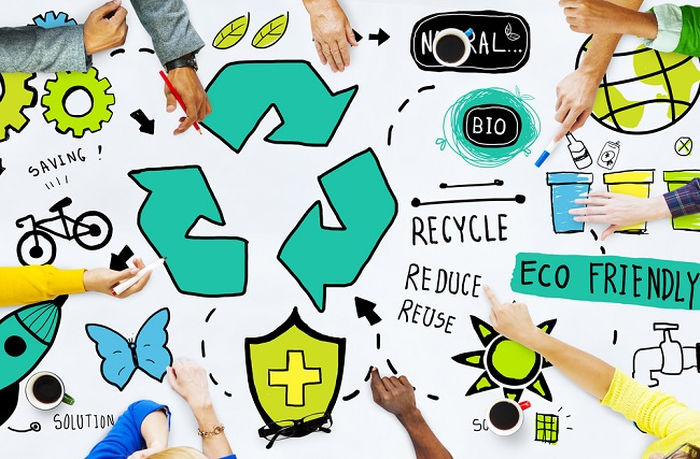10 Eco-Friendly Tips for Students
Author : Archana Posted On : Friday, 2nd December 2016
As a college student, there are probably a thousand other things on your mind besides the current environmental state of the planet and our environment. However, humans are contributing to a dangerous increase in the average global temperature is profound and widely accepted among scientists.
Many of us are largely unaware of how much our everyday choices impact the environment, particularly with the amount of waste we generate and carbon dioxide we produce. Being the generation who will have to tackle this issue head-on, it’s extremely important that we all make efforts to decrease our contribution to environmental ruination. Fortunately, there are numerous ways to go green without having to drastically change your lifestyle. Here are 10 simple tips on how to become more eco-friendly:
1. Use reusable bags : Plastic is incredibly harmful when it ends up in water systems, often harming or killing marine life. A growing trend in grocery stores is to charge an extra few cents for customers to use their plastic bags in the hopes of reducing the practice. Many grocery stores, now sell reusable grocery bags that can be used instead. If carrying reusable bags around a store doesn’t sound appealing or you tend to forget to bring the bags into the store in the first place, some companies even sell reusable bags that fold up into a case that can be clipped onto your keychain.
2. Use reusable water bottles : While it may be tempting to just buy a bottled water or Gatorade from a vending machine or store, reusable water bottles, especially when made out of metal, decrease the amount of plastic used. Buying one reusable water bottle is also cheaper than spending money on a new plastic one every day. Reusable bottles not only decrease the amount of plastic used, but also help you to save money.
3. Recycle : There’s a reason you hear this tip over and over. Recycling has numerous benefits, such as reducing the amount of waste in landfills, saving trees, creating jobs, and conserving energy.
4. Buy recycled items : It’s important to recycle, but it’s just as important to buy recycled items in order to create a demand for recycling in the first place. According to the Environmental Protection Agency’s [EPA], less water and energy is used making recycled items than making brand new items. Many stores sell paper, pencils, and notebooks made out of recycled materials. Reusing old notebooks instead of buying new ones also saves paper and energy.
5. Turn off electronics when not in use : Leaving electronics such as your computer and television on when they’re not in use wastes energy and produces excess carbon dioxide. Most laptops can be set to sleep mode after they have been inactive for a certain period of time, which also reduces energy consumption. Devices that are turned off should also be unplugged if they’re able to be, since they can still consume energy while plugged in.
6. Eat less meat : This doesn’t necessarily mean becoming a full-time vegetarian, although that is an even better alternative. According to the Greenpeace website, raising cows, pigs, and chickens generates as much greenhouse gas emissions as cars and trucks do. Cutting back on the amount of meat you consume per week can help limit the amount of meat that is needed to be produced, therefore limiting the greenhouse gasses given off into the atmosphere. Making efforts to buy local and truly organic meat and other food when possible is also a huge step towards sustainability.
7. Take shorter showers : It’s easy to lose track of time while taking a hot shower on a chilly Syracuse day, but cutting down on shower time saves water and reduces the amount of carbon dioxide released into the atmosphere. You can further reduce the amount of water you use by turning off the faucet while brushing your teeth instead of letting it run the entire time.
8. Only print what you need to print : Only print articles, readings, and homework that are absolutely necessary to have as a hard copy can save ink, paper, and a number of trees required to make that paper. If you do decide to print, printing on both sides is also more sustainable.
9. Only wash full loads of laundry : Rather than washing a few items of clothing at a time, wait until you have an entire load to wash altogether. This saves water, electricity, and saves you trips to the washing machine. Washing your clothes on cold instead of hot also saves energy since about 90 percent of the energy used to wash clothes comes from heating the water, according to the US Department of Energy.
10. Carpool and use public transportation : Carpool with friends or take the bus instead of taking your own vehicle every time you go somewhere. This reduces the amount of pollution released into the atmosphere, reduces gas used, reduces the number of vehicles on the road, limits the need for road construction, and saves you money. Taking it a step further, walking or riding your bike to your destination is a great way to reduce your carbon footprint.
Image Source : http://www.businessnewsdaily.com/images/i/000/009/565/original/eco-friendly-business.jpg?interpolation=lanczos-none&fit=inside%7C700:500
Post Your Comments for this Blog Post
Blogs
South India spends most on higher education
How to pass exams when there is no time to revise?
Research proven tips for increasing childs IQ
How to pursue a course in Australia?
The Ultimate Student Guide For Surving Final Exams
How to crack UPSC Civil Services interview round?